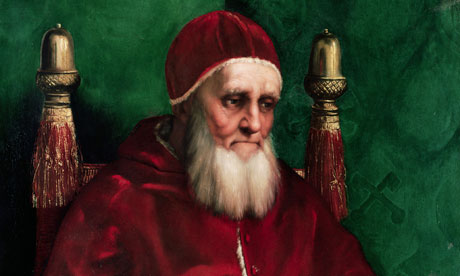
Historians of the mid-20th century debated whether atheism was possible in the 1500s. On the back of Lucien Febvre's major study of Rabelais, The Problem of Unbelief in the Sixteenth Century, they debated whether it was actually possible not to believe at the time. The Prince helps us answer that question.
The book's short chapter on "church states" is a masterpiece of subtle, savage anti-ecclesiastical irony. Church states, Machiavelli observes, are upheld by ancient religious institutions that "are so strong and well established" they "keep their rulers in power no matter what they do or how they live". "Only church leaders possess states without defending them and subjects without governing them," he continues in a tone that might have been Gibbon's.
His criticism doesn't remain at the level of generalities. Machiavelli manages to skewer a number of contemporary pontiffs. Julius II's "credit" for his conquests "was the greater because he did it for the glory of the church, not out of private interest". Leo X's predecessors may have made the church great "by armed force", but "it is to be hoped that … he can make it even greater and more praiseworthy thanks to his goodness and many, many other virtues".
The Prince's anti-papal rhetoric doesn't simply hide behind wit. Pope Alexander, we are told, "showed what could be done with finance and force" and "never did anything but con people. [Indeed] that was all he ever thought about." Writing of the king of Spain, Machiavelli explains that to ensure the church's support, "he perpetrated an act of cruelty dressed up as piety, stripping Marrano Jews of their wealth and expelling them from his kingdom, a move that could hardly have been more distressing". One might rightfully question how this master-advocate of brutal realpolitik can adopt the moral high ground at this point, but that does not change the pugnacity of his anti-papal criticism.
If The Prince were simply anti-clerical, however, it would not have gained the reputation it did. It was, after all, written at a time when even loyal sons of the church recognised the pressing need for reform. The Prince's anti-Christian credentials are stronger than its anti-papal digs.
First, there is Machiavelli's minimal but careful use of the Bible. It was far from strange for humanist tracts to eschew biblical examples, as The Prince largely does. What is more noteworthy is the way Machiavelli does deal with the Bible, when he does. The New Testament is completely absent, and his few Old Testament examples are lauded for their martial abilities rather than their godliness. They are effectively indistinguishable from the book's non-biblical heroes, Moses rubbing shoulders with Cyrus, Romulus and Theseus, and their special role within salvation history is carefully undermined.
Thus, although Machiavelli says "we can hardly say much about Moses, since he merely carried out God's orders", he goes on to say of the other rulers: "When we look into the specific actions each took and the institutions they established, we'll see they don't differ that much from what Moses did under divine guidance." Moreover, "Moses, Cyrus, Theseus and Romulus couldn't have got people to respect their new laws for long if they hadn't possessed armed force". So much for divine guidance and power.
Second, there is his subtle undermining of the Christian understanding of the universe. This is not so much denied as questioned, with the same teasing tone as his observations on church states. In as far as he pays any attention to Christian morality, it is the faintest possible lip service: "Cruelty well used (if we can ever speak well of something bad) …" Sometimes it is not even that: "A leader [who uses cruelty well] has a chance … of improving his position with his subjects and with God too." Perhaps cruelty was part of God's plan after all?
Third, there is his notorious willingness to fake piety, for which he earned vast opprobrium. "There is nothing more important than appearing to be religious," he advises Lorenzo in Chapter 18 with breathtaking, one may say foolhardy, honesty.
Finally, there is the book's deafening silence when it comes to any final divine judgment. All that matters is reputation on earth, and even then a bad reputation is irrelevant as long as it doesn't undermine your hold on power. Divine judgment, the final sanction to which all clung when faced with the pathological politics of the age, was nowhere.
None of this answers the question of whether Machiavelli was himself an atheist. But what it does suggest is that the question itself is anachronistic, relying on a category that only becomes recognisable in Europe two centuries later. Machiavelli may not have been an atheist in the way that Baron d'Holbach understood the term, but he stood so far outside the accepted Christian framework of his age that he might as well have been.
• Follow Comment is free on Twitter @commentisfree

